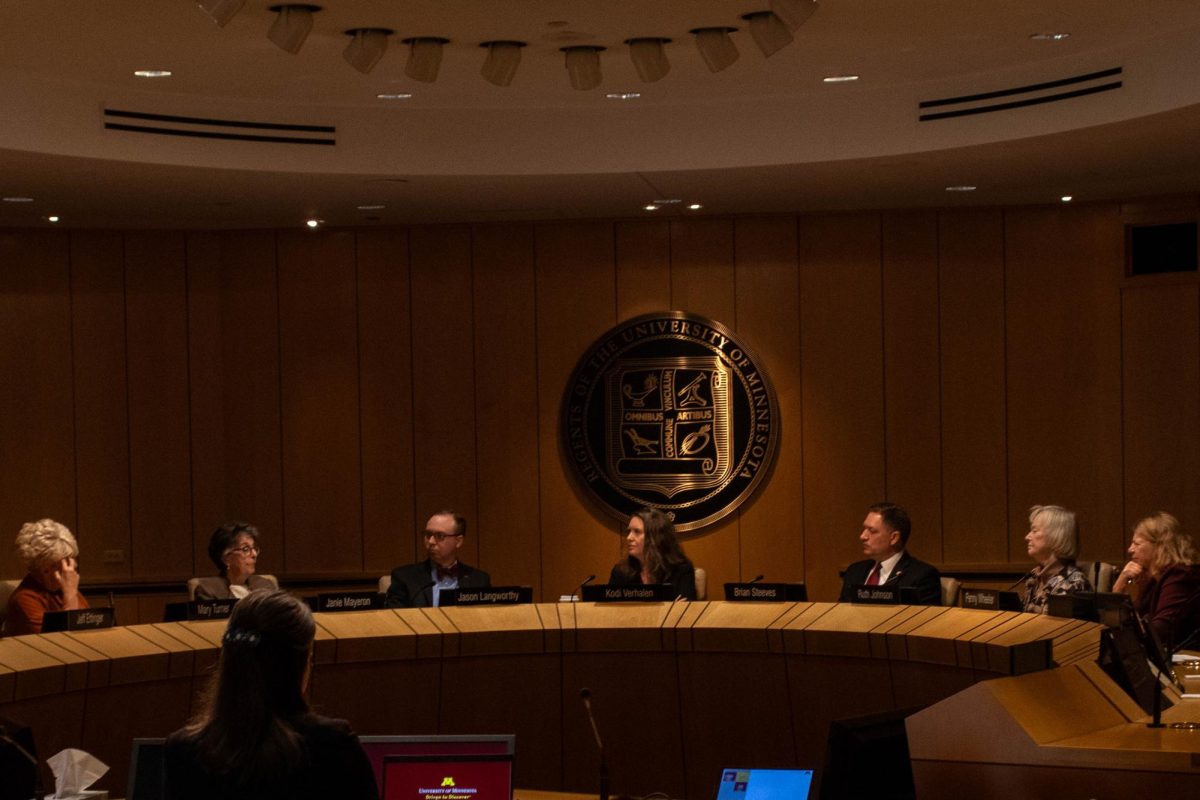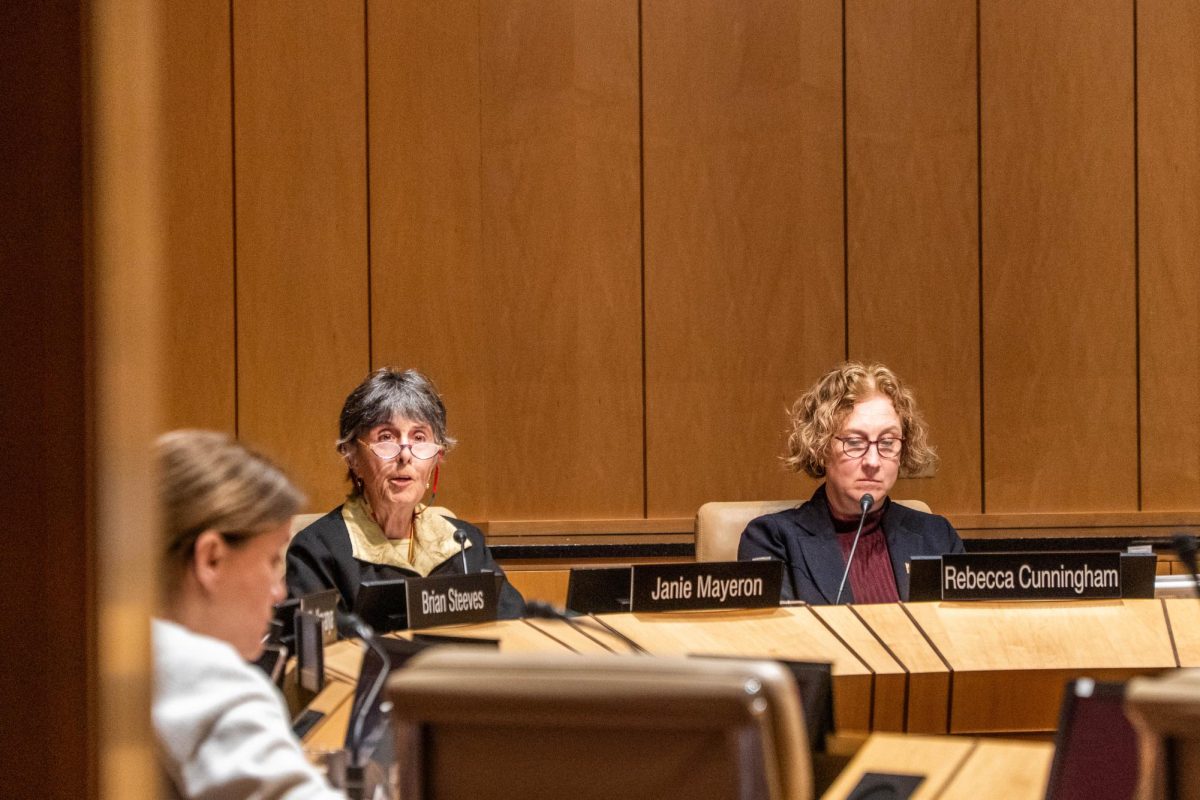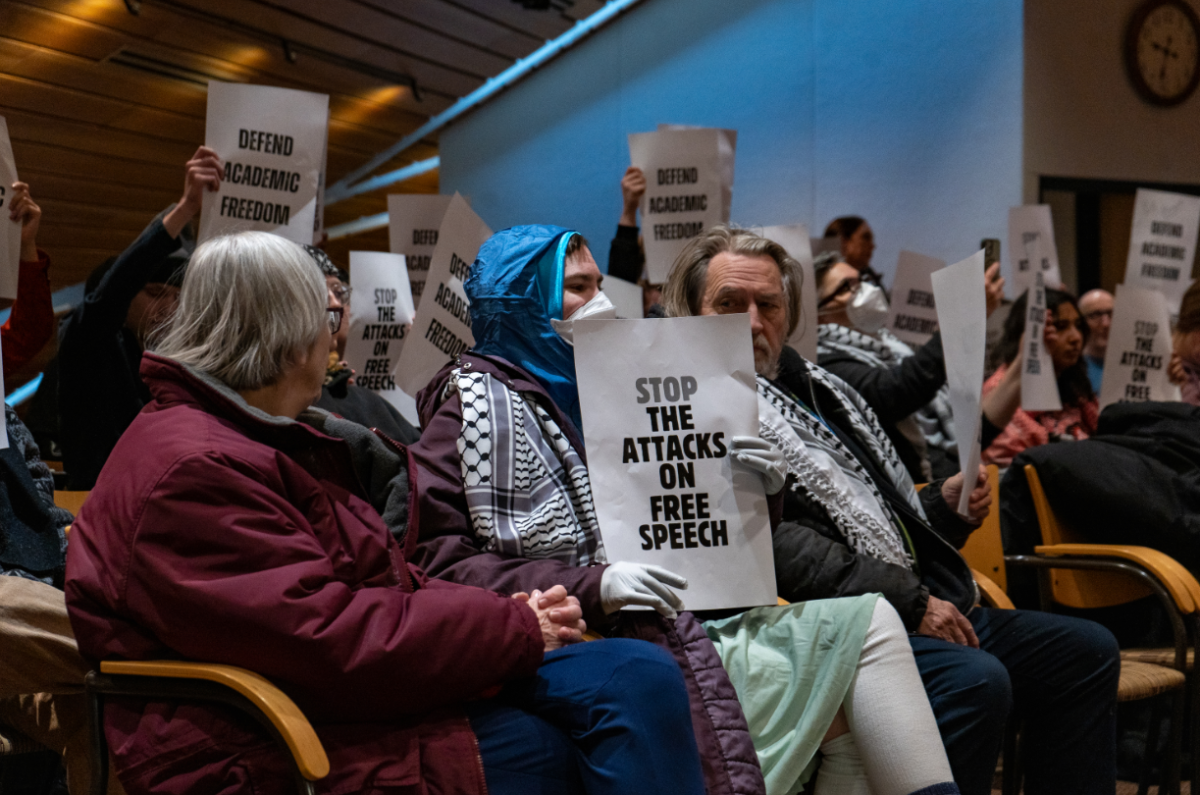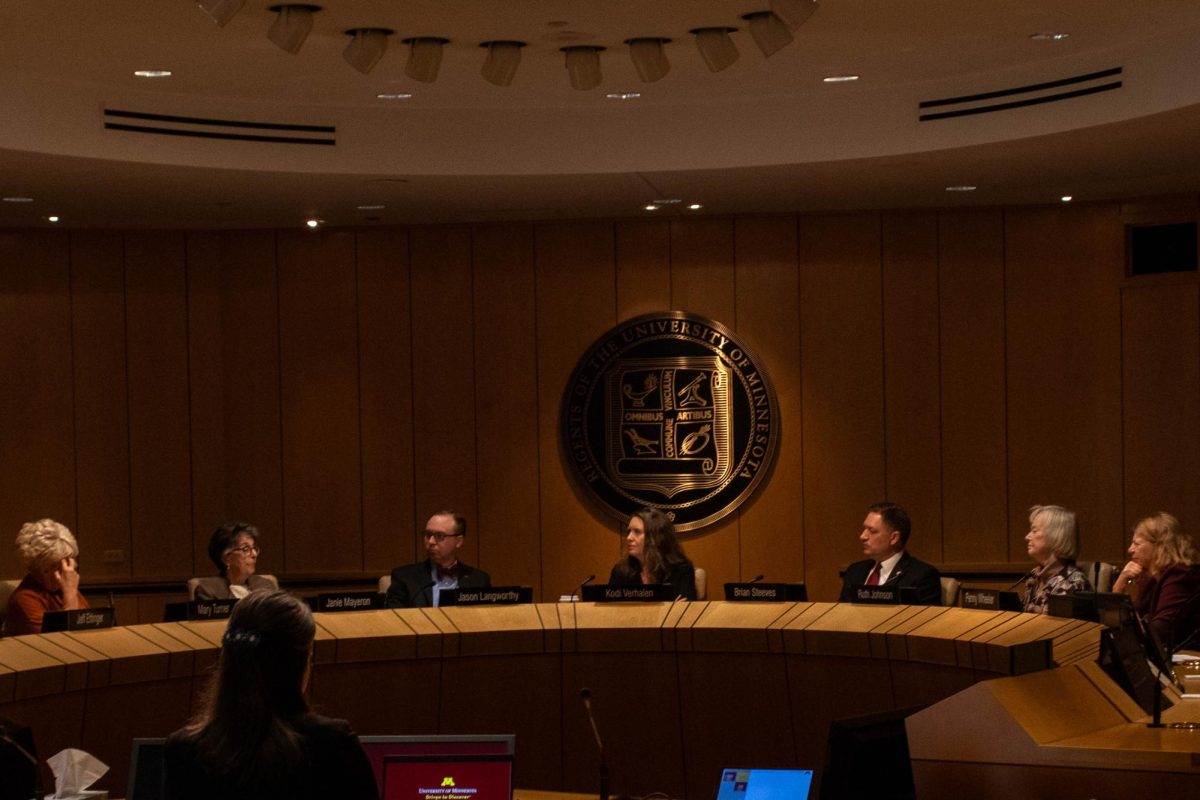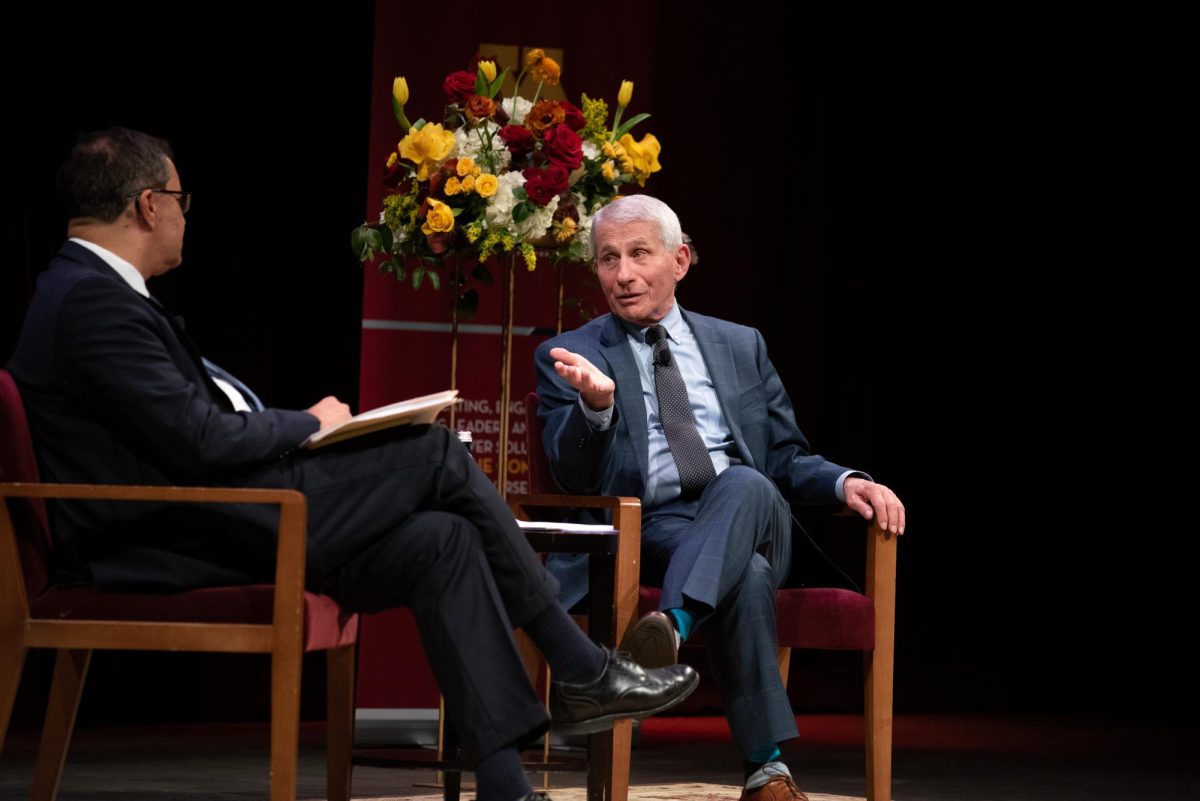The University of Minnesota Board of Regents unanimously passed next year’s annual capital improvement budget for buildings and maintenance, and the annual operating budget, which affects tuition and workers’ pay, in a 9-3 vote at their meeting June 13-14.
Throughout the meeting, regents emphasized the importance of legislative funding and how the lack of new funding this year impacted budget outcomes with both the capital and operating budgets.
“We really struggle with how legislators see our requests,” Regent Robyn Gulley said.
The Board also recognized Interim President Jeff Ettinger on June 14 for his contribution during the 2023-24 academic year. Ettinger was presented with an award of outstanding merit by Board Chair Janie Mayeron and received a round of applause.
“Interim President Ettinger’s steady leadership of the University and intentional relationship building with individuals across the state ensure that University students, faculty and staff were well cared for during our time of transition,” Mayeron said.
2024-25 Annual Capital Improvement and Operating Budgets
The capital budget changed from projections due to the Minnesota Legislature not passing a bonding bill granting the University $500 million to address maintenance concerns during this year’s session, Vice President for University Services Alice Roberts-Davis said.
“This now marks the sixth time in a decade that the legislature has failed to provide capital support to the University,” Roberts-Davis said in reference to requested funding for the capital budget. “It’s a troubling trend.”
Without the $500 million, projects will continue to backlog, Roberts-Davis said.
The only new project in the capital budget is the creation of a modern office space for $6.3 million to facilitate the relocation of University IT staff to the University Park Plaza Building while the Information Technology Building is vacated.
The relocation is part of the Advanced Operations Center project passed in the 2024 capital budget that begins construction in summer 2024. The new center is intended to hold University data workers.
The University also requested $45 million in additional funds for the operating budget, which was not passed by the legislature in a supplemental budget funding request.
Assistant Budget Director Koryn Zewers presented the operating budget, which included tuition increases of up to 5.5% for students on the Twin Cities campus.
There will also be a 4.5% increase for students on the Rochester campus. In addition, a 1.5% increase will apply to students at the Morris, Crookston and Duluth campuses.
Regents Gulley, James Farnsworth and Bo Thao-Urabe did not vote to approve the operating budget due to concerns about rising tuition costs.
The operating budget will provide $1.4 million to cover a reduction in state grant aid to help students with a family income of $80,000-$120,000, Zewers said.
Interim Vice President for Finance and Operations Julie Tonneson presented a list of priorities for the operating budget.
“We believe it achieves the strategic goals and advances the university’s excellence, and it does so in the face of rising costs, flat state support and limited growth opportunities in our recurring miscellaneous revenues,” Tonneson said about the budget.
TRUTH Report Response
Karen Diver, the senior advisor to the President on Native American Affairs, said in an update that the return of the Cloquet Forestry Center to the Fond Du Lac band will be delayed. Diver said this is because the state did not approve the University’s request to void HEAPR bonds used for maintenance and repair of the center.
“I literally went to bed on Sunday night, on the last night of the session, and got up at 4:30 in the morning and was checking the phone to see if we had a bonding bill,” Diver said. “We share, obviously, disappointment with a lot of Minnesotans over the bonding bill.”
Diver said the College of Food, Agriculture and Natural Resource Sciences and the Fond du Lac Band are collaborating on a series of agreements to continue the University’s research, teaching and outreach after the land transfer occurs.
“We will continue to have conversations with the Fond du Lac Band to make sure that partnership is maintained and robust, and we further define the future relationship so we can pick up the legislative again in the fall,” Diver said.
Diver provided updates on the Native American Promise Program, enrollment, and support and pathways, including the approval of an American Indian Studies PhD program in May and the Indigenous Research Policy. Diver also discussed efforts by the University to support tribal sovereignty and cultural heritage.
“I really see a concerted effort of everyone rowing in the same direction, and behaving ethically and wanting that community engagement,” Diver said after finishing her report.
A main priority, Diver said, is the full cost of attendance, particularly housing. Many Native American students are not eligible for financial aid because of their tribe’s economic status.
“Is it appropriate and ethical for you to let yourself off the hook when we’ve built our tribe up to the point where we enjoy some financial stability,” Diver said. “Do we get penalized for something you have nothing to do when the harm was the same?”.
Public Safety Update
University Police Chief Matt Clark said overall violent crime has decreased from 12 incidents in 2023 to nine in 2024.
There was a shooting on campus June 8, which was an isolated incident between two groups not affiliated with the University, Clark said. The University of Minnesota Police Department (UMPD) is currently investigating the case. The last on-campus shooting was 14 years ago.
Currently, UMPD has 62 officers, which is up from 58 officers in January, Clark said. The authorized full-strength number is 73 officers.
“Hiring officers is a slow process and we are trending in the right direction,” Clark said.
The Off-campus Safety Center is opening in September 2024 at 314 4th Ave SE, Clark said. Primary services in the center will be safety education and engagement and a safe study space for students in the afternoon and evening hours.
The center will be home to the Youth Link Somali Elders group, which assists with youth diversion, and UMPD safety ambassadors.
Regent James Farnsworth said he was excited to hear updates on the Off-Campus Safety Center.
“I would love to, and I think others might as well, help celebrate and promote that when it’s open and have a chance to meet the folks who work with the Somali Elders Youth Link,” Farnsworth said.
UMN Divestment
In a 90-minute work session, Chief Investment Officer Andrew Parks and Associate Secretary of the Office of the Board of Regents Jason Langworthy gave a presentation on the University’s consolidated endowment fund and the University’s history of divestment.
The endowment fund consists of money to help support the University’s funding needs into perpetuity, or forever, Parks said. The original investment is never to be spent, but the earnings are distributed to support the University’s core mission, such as research, fellowships and scholarships.
The University’s consolidated endowment fund had a value of approximately $2.3 billion as of March 31, according to the presentation, which makes up approximately 2% of operating expenses. The fund primarily uses third-party fund managers they select to manage the endowment who then select the companies the consolidated endowment is exposed to, Parks said.
The University currently uses 103 fund managers for the consolidated endowment fund, which makes up 98.3% of the fund’s holdings. Tuition cannot be used to fund an endowment, Langworthy said.
“If we were to divest of a handful of companies, we would have to affect that by selling out of the funds that house these companies,” Parks said.
The Board has an endowment investment policy outlining objectives and guidelines for the endowment. Their policy uses an ‘environmental, social & governance’ (ESG) framework for investing to align with the University’s mission and values, according to the endowment presentation.
The Office of Investments & Banking that handles the endowment follows the Board’s policy recommending ESG investments, Parks said. However, this is not mandated.
“While we try to make money, we are trying to make money while doing good, but importantly we do not sacrifice on financial returns in order to align with the ESG considerations,” Parks said.
Divestment sells investments for social reasons, while ESG attempts to align the University’s mission with its investments, Parks said.
In the past, the University has divested from South Africa and Sudan, Langworthy said. It also banned investment in the Total Oil Company.


